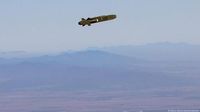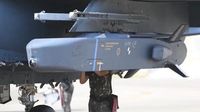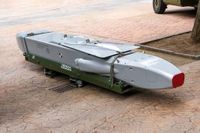Germany’s potential delivery of Taurus long-range cruise missiles to Ukraine represents a significant shift in European military support amid ongoing conflict with Russia. The announcement, backed by Britain, comes in the wake of a devastating missile attack in Ukraine that claimed numerous civilian lives.
Reports from The Telegraph indicate that Friedrich Merz, the incoming Chancellor of Germany, is prepared to supply these advanced weapons, pending approval from allies such as the United Kingdom and France. This marks a notable departure from the previous administration under Chancellor Olaf Scholz, who had blocked such transfers due to fears of escalating tensions with Russia.
The urgency of this decision has been underscored by a recent Russian missile strike on the Ukrainian city of Sumy, which tragically resulted in at least 35 fatalities. Merz condemned the attack as a “serious war crime,” emphasizing the need for enhanced military support for Ukraine.
The Taurus KEPD 350, developed by Taurus Systems GmbH, is a sophisticated air-launched cruise missile that has been in service with the German Luftwaffe since 2005. Weighing around 1,400 kilograms and measuring 5.1 meters in length, the missile boasts an impressive range of over 500 kilometers, allowing it to strike targets deep within enemy territory. Its turbofan engine propels it at speeds of approximately Mach 0.8, flying at low altitudes to evade radar detection.
One of the missile’s key features is its MEPHISTO warhead, a 480-kilogram dual-stage system designed to penetrate hardened targets such as bunkers and command centers. This capability makes the Taurus particularly valuable for Ukraine, which has been seeking to enhance its ability to conduct deep-strike operations against Russian forces.
Merz has suggested that the Taurus missiles could be used to target critical infrastructure, including the strategically important Kerch Bridge connecting Russia to Crimea. Disrupting such infrastructure could significantly hamper Russia’s military operations in the region.
However, the prospect of supplying Taurus missiles has raised concerns about Russia’s potential response. Kremlin spokesperson Dmitry Peskov warned that such deliveries would lead to an “inevitable escalation” of the conflict, framing them as a direct involvement of Germany in the war. Peskov criticized Merz for his stance, stating that it would only provoke further violence.
Despite these warnings, support for the delivery of Taurus missiles appears to be gaining traction among European allies. A British official confirmed the UK’s long-standing support for such a move, stating, “We continue to work with our partners, including Germany, to equip Ukraine as best we can to defend its sovereign territory.”
The political landscape surrounding this issue is complex. While Merz’s Christian Democratic Union (CDU) is poised to form a government with the center-left Social Democratic Party (SPD), the SPD has expressed reservations about delivering Taurus missiles, citing fears of escalation and the potential for Germany to be drawn into the conflict.
On April 16, a Deutschlandtrend survey revealed that 61% of Germans oppose sending Taurus missiles to Ukraine, reflecting growing public unease about the implications of direct military involvement. This opposition may complicate Merz’s efforts to align his coalition partners on this critical issue.
Furthermore, outgoing Defense Minister Boris Pistorius has cautioned that while there are strong arguments for sending the missiles, there are also significant concerns that cannot be publicly disclosed. He emphasized the need for careful consideration of the strategic implications before any decision is made.
Ukraine’s current arsenal includes U.S.-supplied ATACMS and Storm Shadow/SCALP missiles from the UK and France, but these stocks are reportedly dwindling. Merz’s willingness to supply Taurus missiles could provide Ukraine with a much-needed boost in its deep-strike capabilities, especially as Western military support faces increasing scrutiny.
Historically, the Taurus missile has been a cornerstone of Germany’s military strategy, developed in response to the need for precision weapons capable of neutralizing high-value targets without resorting to nuclear options. Its design draws on lessons learned from earlier cruise missile programs, emphasizing stealth, precision, and survivability.
As the conflict in Ukraine continues into its third year, the potential delivery of Taurus missiles represents both an opportunity and a risk. On one hand, these advanced capabilities could shift the dynamics on the battlefield, allowing Ukraine to disrupt Russian operations more effectively. On the other hand, the move could provoke a sharp Russian response, straining European unity and testing the limits of public support for military aid.
Merz’s comments reflect a broader ambition to elevate Germany’s role in European defense, aligning it with the leadership shown by the UK and France. However, the domestic opposition he faces underscores the complexities of navigating military support in a politically divided landscape.
The sustainability of such high-tech arms transfers remains a pressing concern, as European nations grapple with the challenges of scaling up defense production to meet Ukraine’s needs while maintaining their own military readiness. The potential delivery of Taurus missiles could exacerbate these challenges, particularly if Russia intensifies its attacks.
Ultimately, the decision to supply Taurus missiles to Ukraine will hinge on a delicate balance of political, strategic, and industrial factors. As the situation evolves, the implications of this potential shift in Germany’s military policy will be closely watched, both in Europe and beyond.








